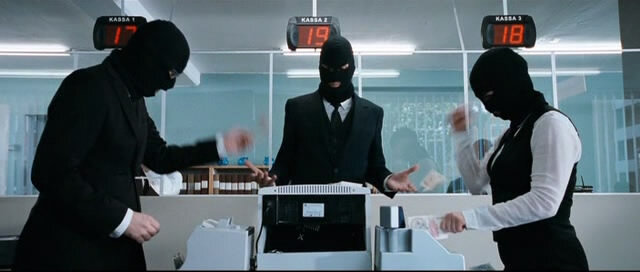All the Noise Noise Noise Noise

Our favorite things this week include a Swedish comedy about painful music and reissue from 1981 of more noise.
Our favorite things this week include a Swedish comedy about painful music and reissue from 1981 of more noise.
Noise Annoys: There are plenty of inspirational movies about music and musicians, but what about movies where these things are the villains? Sound of Noise, which streams on Netflix, is a quirky Swedish comedy that centers around Amadeus Warnebring, a tone-deaf policeman born into a family of famous musicians. He hates music so much that hearing it causes him actual physical pain. Naturally, this puts a strain on his relationship with his family. He spends most of his life struggling with this condition until one day a group of renegade percussionists start causing chaos around the city by using non-traditional, usually illegal, means to make music. When Amadeus tries to arrest them, he realizes that they might actually have the solution to his problems.
The movie is certainly funny and has some hints of a traditional romantic comedy, but it becomes odder as it goes on. Amadeus is sympathetic, but his hatred of music and fierce longing for silence can actually be off-putting for viewers because it’s so hard to compute in a society obsessed with music. Between iPods, radios, and blasting speakers, moments of real silence are few and far between. Most people I know won’t go for a walk longer than five minutes without plugging into their music. Music is a beautiful thing, but Sound of Noise makes you think about the beauty of silence, too. (Lauren Keenan)
Wire’s Goodbye: An often overlooked influence on ‘70s-era punk is art—in New York, Warhol and his satellites, and in London, art school. Art gave that generation’s punk a conceptual underpinning beyond play-fast/get-loaded/rage-hard. That background prompted Wire to work on ways to make songs engaging without relying on conventional pop structures, and on the band’s first three albums—Pink Flag, Chairs Missing and 154—they confronted the hegemony of “good playing” with glorious success as they created songs that worked on their own terms. The 1981 live album Document and Eyewitness brought that phase of the band’s life to a gloriously shambling end. Recorded in 1980 at a handful of show, one at London’s Electric Ballroom chief among them, it sounds like punk at its most self-consciously artsy. It’s sonically messy with ragged performances that test the audience’s patience for abrasive, perverse music, and as the recent reissue released this week shows, time and remastering has made the show no more palatable.
The indifferent mix hasn’t been tinkered with, so the instruments fight for their place in the mix, Colin Newman’s snotty vocals included. “12xU” was the only previously released song on the album when the two disc set was first released, and they intentionally massacre their “hit.” Newman introduces with all the mocking fuck-you he can manage, then they perform a version that sounds like it had been spliced together in the studio to take all the fun parts out and get it down to its essential drive. The album’s never that difficult again, but it’s never easy as Wire interrogates the rock ’n’ roll experience, and it’s not afraid to waterboard its subject.
The reissue does offer a moment of comfort to the audience that the initial release never did. After the end of the live material, there are four previously unreleased songs, and I’ll return to “Second Length (Our Swimmer)” again. The demos—meh.
Wire would never be this band again. They’d always be thorny, but after a few years off for individual projects, they reunited as a more electronic band. When they toured again for the first time in 1985, their opening act was Ex-Lion Tamer, a band hired to play music from the first three albums because they didn’t want to. Document and Eyewitness captures the band very publicly taking the music they’d made to its natural conclusion—one I find magnetic, though I get it if you don’t. (Alex Rawls)






